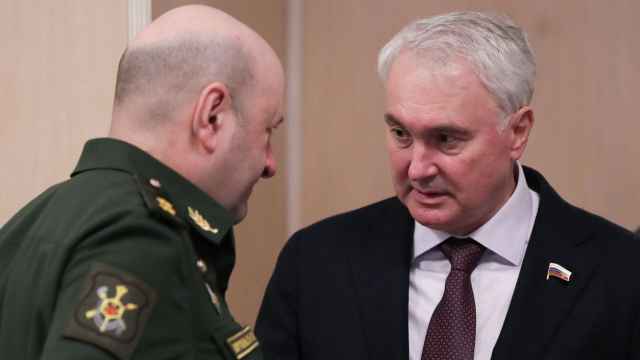Russian lawmakers have passed legislation introducing criminal punishment for “discrediting” and spreading “fake” information about any force fighting for Russia in Ukraine, not just the Russian Armed Forces.
Russia outlawed “discrediting” and spreading “deliberately false” information about the Russian military shortly after the country invaded Ukraine last February. The move has led to the silencing of nearly all anti-war statements and news that clashes with the Kremlin’s narrative of the war.
The new legislation will make it a crime to publicly criticize or spread so-called “false information” about volunteer forces as well as private mercenary units such as the Wagner Group.
“Anyone who is risking their life today to guarantee the security of the country and its citizens is protected from lies and provocations,” State Duma Speaker Vyacheslav Volodin said of the bill shortly after the vote Tuesday.
Once the new law is passed, violations will be punished with up to five years in prison or a fine of up to 300,000 rubles ($3,985) for “public actions” aimed at “discrediting…volunteer formations, organizations or individuals” aiding the Russian military, if that action was committed within a year since the first offense.
In cases when such “public actions” are deemed to have led to grave consequences — including unintentional death or bodily harm — the punishment would be increased to up to seven years in prison or a fine of up to 1 million rubles ($13,300).
Spreading what the authorities deem to be “false information” about military volunteers will be punishable with up to five years in prison or a fine of up to 1.5 million rubles ($20,000).
“Army fakes” that are deemed to lead to “grave consequences” could land a violator a prison sentence of up to 15 years under the new legislation.
The bill must now receive a single vote of approval in the upper-house Federation Council before being signed into law by President Vladimir Putin.
A Message from The Moscow Times:
Dear readers,
We are facing unprecedented challenges. Russia's Prosecutor General's Office has designated The Moscow Times as an "undesirable" organization, criminalizing our work and putting our staff at risk of prosecution. This follows our earlier unjust labeling as a "foreign agent."
These actions are direct attempts to silence independent journalism in Russia. The authorities claim our work "discredits the decisions of the Russian leadership." We see things differently: we strive to provide accurate, unbiased reporting on Russia.
We, the journalists of The Moscow Times, refuse to be silenced. But to continue our work, we need your help.
Your support, no matter how small, makes a world of difference. If you can, please support us monthly starting from just $2. It's quick to set up, and every contribution makes a significant impact.
By supporting The Moscow Times, you're defending open, independent journalism in the face of repression. Thank you for standing with us.
Remind me later.






